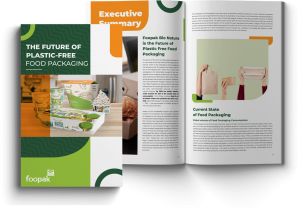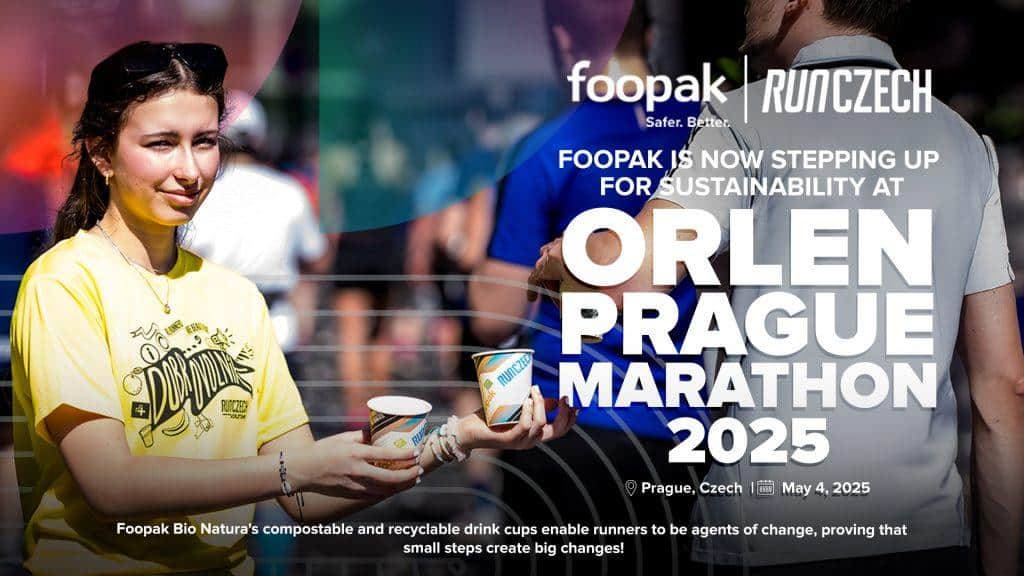
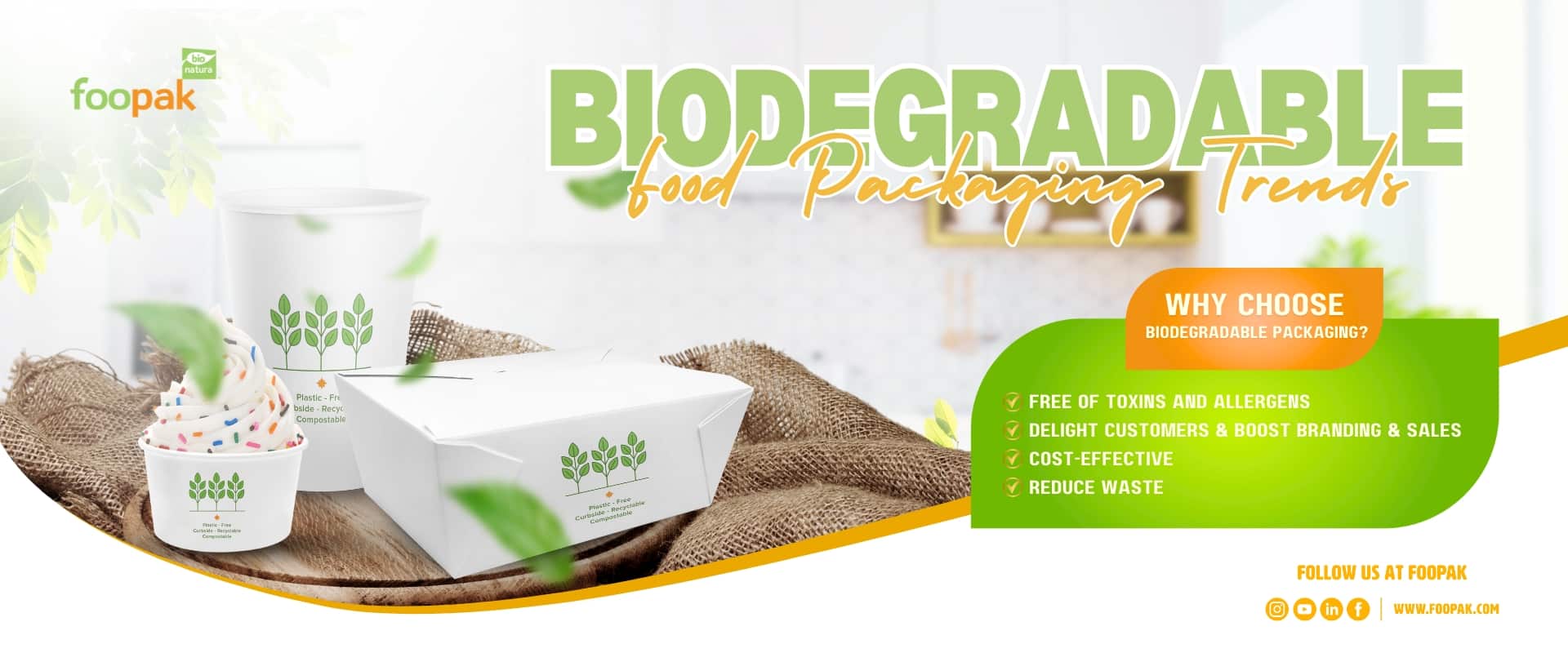
According to TIPA Compostable Packaging, biodegradable packaging is generally defined as any form of packaging that will naturally disintegrate and decompose. The term “biodegradable” is typically used broadly to refer to environmentally friendly packaging materials that biodegrade naturally under any conditions and indefinitely.
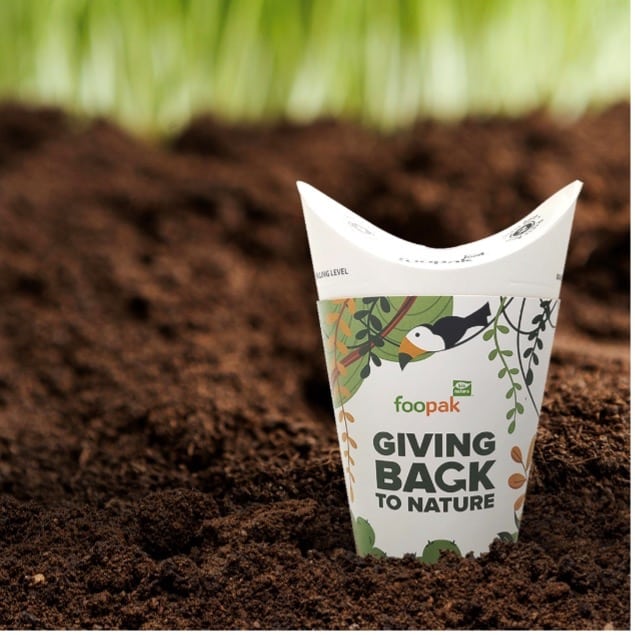
Foopak Bio Natura Biodegradable Paperboard . Source : Internal Foopak
However, we also cannot deny that since the advent of plastic technology in the 20th century until now, plastic packaging is still very popular packaging. According to data projections from the Ellen MacArthur Foundation, if preventive measures are not taken, there will be 12 billion tons of plastic waste scattered in the sea and this number could exceed the number of fish populations in the sea. Such conditions are very dismal, as they can increase environmental pollution that is hazardous to living beings’ health
All parties, both us as producers and consumers, must be involved in overcoming problems like this, namely by choosing biodegradable and compostable packaging. But don’t just choose, get to know the types of biodegradable and compostable food packaging and examples of packaging. The goal is to avoid misidentification because many biodegradable packages still contain plastic.
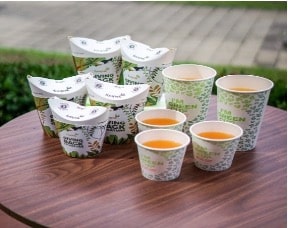
Foopak Bio Natura. Source : Internal Foopak
Types of Biodegradable Food Packaging
Biodegradable food packaging is made from renewable materials, such as compounds found in plants and animals. There are cellulose, casein, collagen, proteins, lipids, and others. The following are the types of biodegradable food packaging that you need to know:
- Seaweed – Based Packaging
Biodegradable and edible grades are types of packaging that can decompose quickly and can be dissolved in warm water. This packaging is the primary packaging in the form of a sachet which is more often used for packaging food and non-food commodities. - Sugar Food Container
This biodegradable packaging is made from sugarcane bagasse which is free from dangerous chemicals. This packaging is also primary packaging in the form of sachets, and more often for packaging food commodities. The advantage of sugar food container is that they are food grade, resistant to cold, hot, liquid food, or those you put in the microwave. Don’t forget to check whether PFAS has been added to the packaging because usually, to withstand oil, such packaging adds PFAS to the material. - PLA Bowl & Cup
This type of PLA Bowl & Cup packaging is made from corn flour. PLA Bowl & Cup is made in such a way that it looks and works like normal plastic packaging.
This packaging can be primary packaging as a container for food commodities. The advantages of PLA Bowl & Cup include natural materials, biodegradable and industrial compostable, food grade, waterproof and sturdy. - Packaging made from fronds
This type of biodegradable packaging is food containers and plates. As the name suggests, this packaging is made from a composition of areca nut fronds which is easily biodegradable.
As primary packaging, frond packaging is Frond packaging is often used as primary packaging for food commodities. Which also has the advantage of being food grade, 100% natural, biodegradable and decomposes in the soil within 60 days, waterproof, sturdy, heat resistant up to 2000 C, and sterilized. - Paper Packaging
Many business choose paper as product packaging. An example of paper packaging that is environmentally friendly, recyclable and biodegradable is Foopak Bio Natura, which has also been certified by ISEGA. - Bamboo packaging
Bamboo is a plant that grows quickly. There are many types of packaging made from bamboo, such as packaging for cleaning fluids, packaging for cosmetic products, and others. In addition to being very sturdy and usable directly as packaging, bamboo is also aesthetically pleasing. - Gelatin Films
This type is quite popular for food packaging, because of its non-toxic nature, low cost, and reliable film-forming capacity. According to the FDA, gelatin is safe as a food additive, because it contains microbial cellulose. Microbial cellulose can inhibit the growthpathogens that cause food borne illnesses, including E.coli and Staphylococcus. That way, this type is safer than conventional plastic types. - Rice Husk
In a study, rice husks have bioadsorbent properties. This means that rice husks are able to absorb pollutants from the surrounding environment. Products that use rice husks, such as shatterproof serving bowls and lunch boxes that can be tightly closed.
These are the types of biodegradable food packaging. All materials used to make this packaging are easily decomposed by microorganisms into CO2, air and biomass. The more people use biodegradable packaging, the lower the level of environmental pollution which can impact human and animal health. Not only is it biodegradable, but what is important is that it is compostable.
Biodegradability refers tothe ability of any material or material to be decomposed by microorganisms (such as bacteria or fungi) (such as bacteria or fungi) naturally, under supporting conditions such as temperature, humidity level, with or without oxygen, and solar heat.
Therefore, almost all materials can decompose naturally, but they decompose over a long period of time, which can be weeks, months, years or even hundreds of years. For example, vegetables can decompose in a matter of days, while paper can decompose in a matter of months. Even plastic can break down into small parts called microplastics.
But unfortunately, this does not guarantee that decomposed plastic material does not contain toxins and is 100% safe for the environment.
Compostable is the ability of a material to decompose naturally with the help of human hands, using several organic raw materials, water, oxygen and other materials so that the material can be composted well and has the ability to maintain the soil. Compost itself is divided into two types, namely home compost and industrial compost. Home compost is more environmentally friendly because everyone can do it at home with the correct compost method. Meanwhile, industrial compost often ends up in landfills.
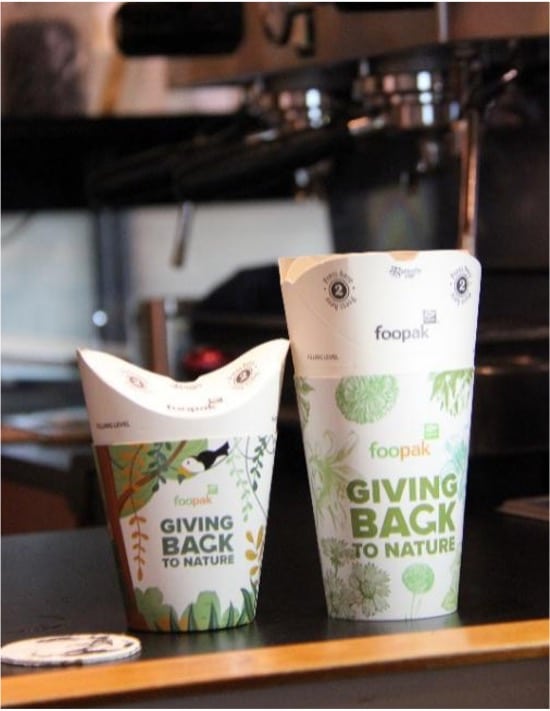
Foopak Bio Natura. Source : Internal Foopak
Why Should Start Using Biodegradable Packaging?
For business owners, using biodegradable packaging has many benefits, especially in branding and increasing customer satisfaction. This is the advantage of using biodegradable packaging for specific businesses.
- Free of Toxins and Allergens
The choice of biodegradable packaging is still limited, but most of the materials available are generally non-toxic and allergy-free. This is an important consideration for consumers when purchasing products because the packaging composition will not cause health impacts for them. - Delight Customers and Increase Branding & Sales
If you as a business actor focus on health and a pleasant customer experience, you will indirectly implement an effective branding strategy. Including when the product is packaged using biodegradable packaging. Many shoppers are now more environmentally conscious, so they prefer to buy from businesses that care about plastic pollution and provide more environmentally friendly biodegradable packaging.By campaigning for environmentally friendly packaging, your business branding will work and brand awareness will increase. It is not impossible that customers will continue to loyally buy your product because it has a visionary “mission” for the surrounding environment.
- Cost Effective
For businesses, investing in biodegradable materials can certainly cut costs significantly, use fewer resources and save on storage. Biodegradable packaging that is easy to recycle is generally flexible, easy to fold, so it can be stored anywhere.
This material can also be recycled easily. This investment is certainly more affordable compared to glass and cup items made from ceramic or clay, which break easily. You can also allocate funds more freely to other things that are more profitable. - Reduce waste
According to the Conserve Energy Future website, biodegradable waste can decompose in just a few months, of course depending on the materials used and how it is disposed of. Other types of conventional plastic waste constitute 13 percent of the waste stream, namely 32 million tons of waste per year, and only 9 percent of this type of plastic can be recycled.
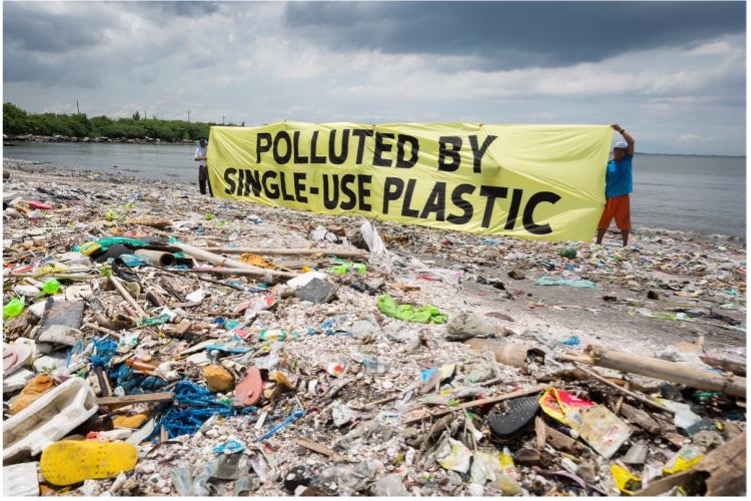
Plastic Pollution. Source : Greenpeace.org
Why Should Choose Foopak Bio Natura?
If you commit to using biodegradable packaging, then this will be the best investment in the future. To get the raw materials, you can choose Foopak Bio Natura as a raw material solution for making biodegradable packaging.
There are many types of raw materials to choose from to make environmentally friendly, professional and classier food packaging products. Advantages like this can also increase the value of the products you sell.
Foopak Bio Natura products are recyclable, biodegradable and compostable. Apart from that, Foopak Bio Natura has also received Flustix certification as a plastic-free product. Foopak Bio Natura is a brand that can be an environmentally friendly biodegradable paper packaging solution for your products. Not only is it safe, Foopak Bio Nature has also passed the food grade test by ISEGA and FDA from Intertek, and has a Halal certificate.
Let’s be wiser and start using biodegradable biodegradable packaging for food and drinks. This biodegradable packaging is made from natural materials that are not harmful to the environment and the user. Those are the types of biodegradable food packaging and the reasons why you should start using it.
As a business personaiming to launch an environmentally friendly campaign, you can choose from the types of biodegradable food packaging mentioned above, according to your needs. Still having trouble deciding which biodegradable packaging is best for your product? You can entrust your environmentally friendly product packaging to Foopak Bio Natura.

